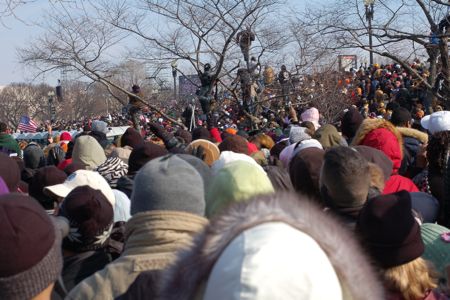Mind the Gap: January 2009 Archives

Directly and indirectly, this series of illustrations by Maira Kalman provides a crystal clear example of why, no matter what the naysayers say, art is a vital part of human society that is just as deserving of public support as our auto industry and financial institutions (perhaps more so, when you consider the details). Why does that make us nervous sometimes, like it's some sort of hyperbole that would make "realistic" people laugh? Would you want to be left alone in 2020 with only reality TV?
It's on us. If this issue speaks to you and you have a few minutes today, write your congresspeople and let them know what you think. Specifically, if you would like more information on the $50,000,000 supplement for the National Endowment for the Arts that's attached to the American Reinvestment and Recovery Bill of 2009, you can get further details here.
**Another photo from my inauguration day stash.

Now we wait. There's been talk about arts policy proposals and such already, of course. If Obama got up this morning after that marathon performance (his fierce new ride didn't turn into a pumpkin until well past 3 a.m., apparently) and went to work, what should the arts community be up and at in the first 100 days? And in the spirit of "ask not what your country can do for you...", while we're brushing off and feeling all hopeful and intellectually fired up again, what should we be organizing to help propel the nation forward now that the weekend of a hundred speeches is winding down?
Listen on demand: Terry Gross interviews Steve Knopper, author of Appetite For Self-Destruction: The Spectacular Crash of the Recording Industry in the Digital Age.
In case you were sleeping these past few decades, crash your way through the recent past in recording industry issues. Made me so nostalgic for the time I spent during high school wandering the aisles of Best Buy picking out CDs, strangely. Do I miss the middle man? (Gulp.)
[h/t to the NPR-listening husband]
Is it sad that the first thing I thought of when I saw this slide show was "music publisher lawsuit"? With Beethoven, though, I think you're clear.
Oh, and did you see Lawrence Lessig with his new book Remix on the Colbert Report last Friday? Well, if you didn't, you can't watch it on YouTube, which is sort of sharply illustrative of the issues at hand considering the topic and the fact that Lessig issued a remix challenge using the segment itself as source material.
The interview was not that exciting aside from Stephen's on-air remix of the book with his Sharpie, but the intellectual property/usage/rights issues were some of the same ones that continually poke at my brain, so I was engaged. In my own endeavors, I don't want to screw other people over, but technology has changed the playing field even if it hasn't yet clearly changed the rules of the game we're playing.
For instance, I took a picture to illustrate this post from the NYTimes website without asking for permission. I did it to illustrate a bit of what Lessig was talking about, but I feel guilty about having done it, which is how my mom and the Catholic church taught me to identify that my actions are wrong. Does it matter that the only reason that picture would be here is 1) to attract attention the article it links to and 2) to make this page more intellectually interesting and attractive? I could argue that this post is simply "added value" and does not devalue any of the original content in any way. We have to think about how the digital age has changed the idea of copies and distribution, but not money, of course, and that's generally where and why things get confusing and uncomfortable. These days the copies and the distribution come practically free, but the content can cost a fortune in blood, sweat, or actual cash to produce, and that tends to make people nervous and protective. The NYTimes would hardly have cared about my little xeroxing escapades at Kinkos, but should they care about my blog? I can argue that it harms no one, but should that matter? What if they don't like people like me who write about arts and culture and don't want to be associated with my "brand". Is that enough? Can this stand on a "fair use" argument, or are we pushing our luck and our common morality trying to justify such actions with that one?
I like the idea of a creative commons, but I'm not sure I feel that participation should be mandatory. But if participation isn't mandatory, big guys like Viacom and the NYT won't/can't/don't have to waste their time with small fries like me. This can take the thinking in a few directions. The one I can really throw my support to is the "too bad, make your own" argument because it might actually lead to even more and higher quality creative output. If I can't use your picture, I might create an even better one to fill the void. However, then I create in my own sandbox, and there's no drawing a mustache on a metaphoric Mona Lisa anymore.
Here's an interesting take on how 21st-century orchestra musicians deal with the fact that their jobs often drive them a little crazy: they go out and get additional jobs.
"Dual careers are almost always a bonus--both for the income and for the variety and exposure to contrasting environments," says Barbara Sher, author of the 2006 book "Refuse to Choose: A Revolutionary Program for Doing Everything That You Love."
The article politely leaves out the part about how a person manages to eat, sleep, shower, and interact with loved ones while treading this career path. Hey, welcome to the new economy! With luck, one of those jobs comes with health insurance (a.k.a. access to the supply closet where the band-aids and ibuprofen are kept), so just be thankful. Double bonus: The article was penned by none other than oboe-playing journalist Blair Tindall, of Mozart in the Jungle infamy.
But seriously, I know from personal experience that not tossing all one's eggs into the same basket helps keep the creative life a little more charged up and balanced out, even if it cuts into playtime pretty regularly. If this article leaves you contemplating a career move, you can to dip a toe into the glamorous world that is classical music journalism (no jokes about the double sinking ship, please) with this back stage pass to the NYPhil's season press conference. Also, consider the potential of jingle writing.

When I first moved to New York, I often wondered why so many writers dream of typing their way to success in Gotham. Sure, there are plenty of coffee shops and it's probably easier to network your way into penning an article for Harper's at cocktail parties in Manhattan than it would be in Missoula, but with so much activity 24/7 and a cost of living that just never seems to give a sucker a break, isn't the place also just a tease? You can chat up an editor from Farrar, Straus & Giroux, but you're so busy copyediting for one place and freelancing for three more and meeting friends for drinks and plays and shows that you realize with horror that you don't have a single new idea to pitch.
Or maybe it was just a personal thing, arriving in New York as I did from the hills of Appalachia. Perhaps I just romanticize the drama of the extremes because the suburbs, where I came of angst-y age, were what really filled me with existential dread?
But then today I saw some deep-seated suspicions writ large: How the city hurts your brain.
Truth is, artists need nature! Well, maybe not this much nature, but all the same. And here I thought I needed to escape the urban landscape just because of an ever-increasing desire to smack rude strangers in the subway. But this week's science tells us that there's more to those artist colonies in the woods than just the quaint fireplaces and the really good food. We need to see open space in order fill it with our creativity. Or is that just one way to spin this study? Assuming most artist types don't have the luxury of a country home and a pied-à-terre in the city, where should the aspiring put down roots?
(Personally, I vote for the space that requires the absolutely smallest time investment in cleaning it.)
Blogroll
AJ Ads
AJ Blogs
AJBlogCentral | rssculture
Terry Teachout on the arts in New York City
Andrew Taylor on the business of arts & culture
rock culture approximately
Laura Collins-Hughes on arts, culture and coverage
Richard Kessler on arts education
Douglas McLennan's blog
Dalouge Smith advocates for the Arts
Art from the American Outback
For immediate release: the arts are marketable
No genre is the new genre
David Jays on theatre and dance
Paul Levy measures the Angles
Judith H. Dobrzynski on Culture
John Rockwell on the arts
Jan Herman - arts, media & culture with 'tude
dance
Apollinaire Scherr talks about dance
Tobi Tobias on dance et al...
jazz
Howard Mandel's freelance Urban Improvisation
Focus on New Orleans. Jazz and Other Sounds
Doug Ramsey on Jazz and other matters...
media
Jeff Weinstein's Cultural Mixology
Martha Bayles on Film...
classical music
Fresh ideas on building arts communities
Greg Sandow performs a book-in-progress
Exploring Orchestras w/ Henry Fogel
Harvey Sachs on music, and various digressions
Bruce Brubaker on all things Piano
Kyle Gann on music after the fact
Greg Sandow on the future of Classical Music
Norman Lebrecht on Shifting Sound Worlds
publishing
Jerome Weeks on Books
Scott McLemee on books, ideas & trash-culture ephemera
theatre
Wendy Rosenfield: covering drama, onstage and off
Chloe Veltman on how culture will save the world
visual
Public Art, Public Space
Regina Hackett takes her Art To Go
John Perreault's art diary
Lee Rosenbaum's Cultural Commentary
Tyler Green's modern & contemporary art blog
